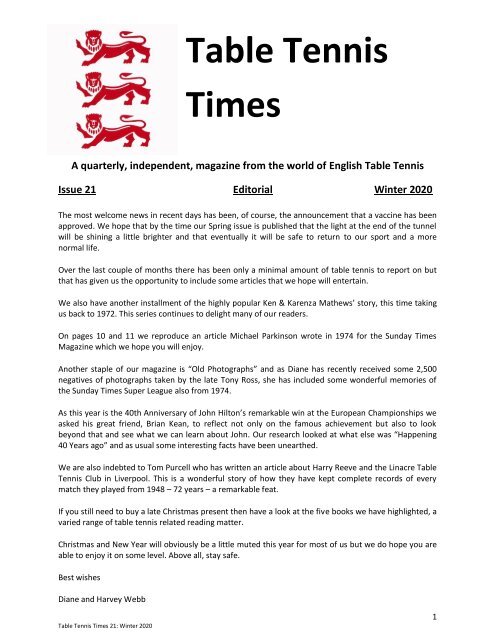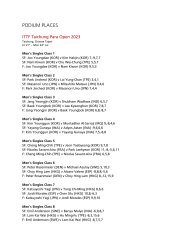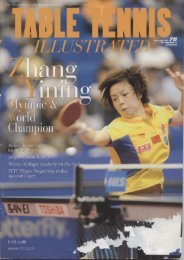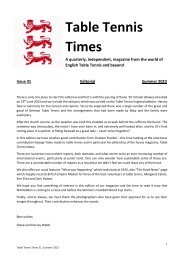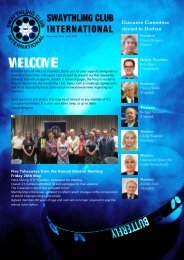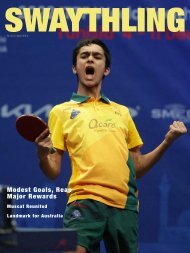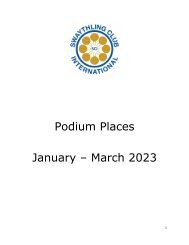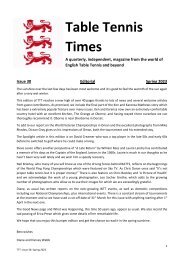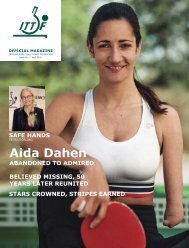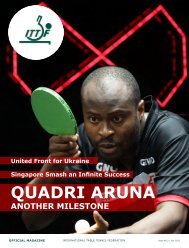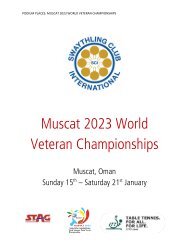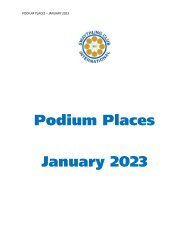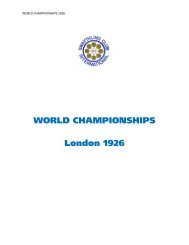TTT 21. Winter 2020.
You also want an ePaper? Increase the reach of your titles
YUMPU automatically turns print PDFs into web optimized ePapers that Google loves.
Table Tennis<br />
Times<br />
A quarterly, independent, magazine from the world of English Table Tennis<br />
Issue 21 Editorial <strong>Winter</strong> 2020<br />
The most welcome news in recent days has been, of course, the announcement that a vaccine has been<br />
approved. We hope that by the time our Spring issue is published that the light at the end of the tunnel<br />
will be shining a little brighter and that eventually it will be safe to return to our sport and a more<br />
normal life.<br />
Over the last couple of months there has been only a minimal amount of table tennis to report on but<br />
that has given us the opportunity to include some articles that we hope will entertain.<br />
We also have another installment of the highly popular Ken & Karenza Mathews’ story, this time taking<br />
us back to 1972. This series continues to delight many of our readers.<br />
On pages 10 and 11 we reproduce an article Michael Parkinson wrote in 1974 for the Sunday Times<br />
Magazine which we hope you will enjoy.<br />
Another staple of our magazine is “Old Photographs” and as Diane has recently received some 2,500<br />
negatives of photographs taken by the late Tony Ross, she has included some wonderful memories of<br />
the Sunday Times Super League also from 1974.<br />
As this year is the 40th Anniversary of John Hilton’s remarkable win at the European Championships we<br />
asked his great friend, Brian Kean, to reflect not only on the famous achievement but also to look<br />
beyond that and see what we can learn about John. Our research looked at what else was “Happening<br />
40 Years ago” and as usual some interesting facts have been unearthed.<br />
We are also indebted to Tom Purcell who has written an article about Harry Reeve and the Linacre Table<br />
Tennis Club in Liverpool. This is a wonderful story of how they have kept complete records of every<br />
match they played from 1948 – 72 years – a remarkable feat.<br />
If you still need to buy a late Christmas present then have a look at the five books we have highlighted, a<br />
varied range of table tennis related reading matter.<br />
Christmas and New Year will obviously be a little muted this year for most of us but we do hope you are<br />
able to enjoy it on some level. Above all, stay safe.<br />
Best wishes<br />
Diane and Harvey Webb<br />
Table Tennis Times 21: <strong>Winter</strong> 2020<br />
1
ITTF Events Round Up<br />
ITTF Women’s and Men’s World Cups<br />
The ITTF launched its “Project Restart” which incorporated three events in the Far East featuring many<br />
of the same players in each event, and we have reports on all three. Some interesting points came out<br />
of the project as the ITTF put everyone in the so called “Bubble” for the entire period of 66 days and did<br />
not have a single case of Covid. Having taken advice from the World Health Organisation they put many<br />
measures in place and they obviously did a good job; transporting players and officials around on a<br />
dedicated aeroplane and taking over complete floors in the hotels involved, ensuring there was no<br />
mixing with anyone outside the “Bubble”, regular testing, mandatory mask wearing apart from in the<br />
playing area all played their part.<br />
Weihai, China was the venue for the first event, the<br />
Women’s and the Men’s World Cups. Twenty one<br />
ladies took part in the women’s competition, held<br />
from 8 th -10 th November <strong>2020.</strong> All but two of the<br />
Quarter-final places going to Far Eastern players,<br />
the exceptions being Lily Zhang of America and Ying<br />
Han of Germany. A maximum of two players per<br />
Association were allowed and the final saw the two<br />
Chinese players meet with World Number 1, Chen<br />
Meng, taking the title, her first, and World Number<br />
3, Sun Yingsha, the Runners-up spot - the score -11,<br />
Sun Yingsha, Runner-up, Chen Meng, Winner, Mima Ito,<br />
3rd place. Photo courtesy of the ITTF<br />
6, 9, 6, 8. The two Semi-finalists were Ying Han and Mima Ito of Japan with Ito beating Han 2, 7, 9, 4 in<br />
the Play-off for 3 rd and 4 th places.<br />
Liam PItchford.<br />
Photo courtesy of the ITTF<br />
21 players including England’s Liam Pitchford, participated in<br />
the Men’s event which ran from 13 th -15 th November <strong>2020.</strong><br />
Pitchford last took part in the Men’s World Cup in Liverpool in<br />
2012 alongside Paul Drinkhall where they both finished fourth<br />
in their respective groups. Pitchford started well winning both<br />
his group matches against Chuang Chih-Yuan (World 30) from<br />
Chinese Taipei, -9, 6, 8, 11, 11 and USAs, Kanak Jha (World<br />
27), -7, 4, -13, 5, 5, -10, 4. He then met Dmitrij Ovtcharov<br />
(World 11), in the last 16 but in a close match fell to the<br />
German -10, 9, 4, -5, -11, -7.<br />
The latter stages of the competition were dominated too by<br />
Asian players with all but two of the Quarter-finalists, Ovtcharov<br />
and Mattias Falck of Sweden, coming from the Far East. The final<br />
was a closely contested match between the two Chinese players<br />
Fan Zhendong and Ma Long and in a thrilling match the World<br />
Number 1, Zhendong, clinched the title with a -3, 8, 3, 6, -7, -7,<br />
9, victory. Tomokazu Harimoto, Japan, took the bronze medal in<br />
the third/fourth play-off match with a 4-3 win over Jang Woojin<br />
of South Korea.<br />
Table Tennis Times 21: <strong>Winter</strong> 2020<br />
Fan Zhendong.<br />
Photo courtesy of the ITTF<br />
2
ITTF Finals<br />
Liam Pitchford was the only English player in either the Men’s or Women’s events held between 19 th -<br />
22 nd November 2020 in Zhengzhou, China. Pitchford in his first match in the Round of 16 faced Brazilian,<br />
Hugo Calderano (World 6), Pitchford only lasted 33 minutes before succumbing -4, -4, -11, -10.<br />
Calderano was in blistering form and took revenge on Pitchford for his three defeats on the occasions<br />
when they had met previously.<br />
Liam Pitchford, far end, v Hugo Calderano of Brazil. Photo courtesy of the ITTF.<br />
Some of the other results in the same round showed the Chinese dominance as Fan Zhendong won 6, 2,<br />
5, 7, Ma Long by 10, 1, 6, 4 and Xu Xin 10, 8, 6, 5.The best match perhaps was between Simon Gauzy of<br />
France and Sweden’s, Mattias Falck, with the score in Falck’s favour 4, 9, -5, -7, -10, 6, 7.<br />
Eventual winners were Ma Long, who beat Fan Zhendong in the final 4-1, and Chen Meng who also won<br />
4-1 against Wang Manyu in the all Chinese Women’s final. German, Petrissa Solja, was the sole non<br />
Asian in the Quarter-finals in the Women’s event. Mattias Falck and Hugo Calderano were the two non<br />
Asian players in the Men’s Quarter-finals, the two events once again being dominated by players from<br />
the Far East.<br />
Chen Meng, far side, v Wang Manyu. Photo courtesy of the ITTF<br />
Table Tennis Times 21: <strong>Winter</strong> 2020<br />
3
The Karenza and Ken Mathews Story continued<br />
1972<br />
Ken: Karenza had a bad cold at the start of the New Year. But bravely she rallied (!) in time for the<br />
English Closed Championships which were held at the Crystal Palace from the 6 th to 8 th January. She<br />
played very well, beating Lesley Radford to win the Women’s Singles, thus retaining the title of England<br />
Champion which she won a year ago. She also went on to win the Women’s Doubles with Jill<br />
Hammersley and the Mixed with Denis Neale - a clean sweep - Hooray!<br />
The report of the tournament was written for Table Tennis News by John Woodford, a sports journalist<br />
who wrote for several national newspapers. This is what he wrote about the Women’s Singles:<br />
‘Karenza fought herself almost to a standstill for her wonderful victory. She overcame very stiff<br />
challenges at nearly every hurdle. Her dedication and control are truly world-class. Never flinching in her<br />
game of continuous flowing attack, just going on and on taking the game to her opponent, piling on the<br />
speed and the topspin until she reached the required number of points. In the final Lesley established a 2-<br />
1 lead and it was only another great effort by Karenza that gained her the last two games and the crown<br />
for the second time. Karenza’s most wanted prize was in the new rankings, the No.1 spot – hard earned<br />
indeed from Jill Hammersley.’<br />
The new England ranking list was published a few days later with<br />
Karenza back at Number One.<br />
Another accolade for Karenza was that her picture appeared in the<br />
Butterfly magazine, a publication circulated world-wide by Butterfly,<br />
the Japanese Table Tennis Company.<br />
From 1 st January Les Greswell had become the full-time England<br />
Coach and Team Captain.<br />
Exactly when this happened we are not sure but we think it was on a<br />
trip to a tournament up North; Karenza and I were travelling in our<br />
new car, a Morris Marina. We were driving back to the hotel where<br />
Table Tennis Times 21: <strong>Winter</strong> 2020<br />
4
we were staying and on the way we gave Johnny Leach a lift. As we were going along in our brand new<br />
car I went to change gear - and the gear lever came off in my hand! We thought Johnny was going to<br />
have a heart attack he was laughing so much. We called out the AA; the mechanic managed to fix it<br />
temporarily for us and so we were able to limp home. The next week the Marina went in to the garage<br />
where they repaired it properly. Apparently it was a common fault on the new Marinas.<br />
Karenza: On 21 st January we flew to Bucharest in Rumania. We stayed there overnight. (We saw the film<br />
Grand Prix in the evening - it had Rumanian sub-titles.) Next day we flew on to Cluj for the Rumanian<br />
Open. On this trip our number one ranked girl,<br />
Linda Howard and I were the England Women’s<br />
team. In the team event we convincingly lost 3-0<br />
to the Rumanian second team. I was seeded<br />
third in the Singles but didn’t live up to my<br />
status as I lost in the second round to another<br />
Rumanian called Leszay, an awkward rubber bat<br />
chopper! Linda did rather better, reaching the<br />
quarters before losing to Henrietta Lotaller of<br />
Hungary. This is a picture of Linda taken at about<br />
this time.<br />
Together we lost in the 3 rd round of the Doubles to the number two seeds, Maria Alexandru and Carmen<br />
Crisan of Rumania and, partnering Nicky Jarvis, he and I lost in the third round to two Hungarians.<br />
Next day we had an interesting twelve hour train journey to Bratislava, which left Cluj at 5 a.m. Great! In<br />
the Czech Open Linda and I lost to Yugoslavia, then, in the Singles I lost to Claude Bergeret of France and<br />
Linda lost to a Czech girl called Reidlova. In the Doubles we did quite well but lost to the third seeds<br />
Eleonora Mihalca and Crisan. Nicky and I lost in the second round of the Mixed.<br />
On the way home we had to take a taxi from Bratislava to Vienna and then we flew home from there. A<br />
lot of travelling! Not a great trip - except that I got on really well with Linda who was a lot of fun.<br />
On 23 rd February Ken and I drove up to Teesside for the 3 Star Tournament there. Perhaps I should have<br />
explained that all the members of the International Squad had to play in the 3 Star tournaments in<br />
England. I beat Jill Hammersley in the final of the Singles. Jill and I won the Doubles and I won the Mixed<br />
with Nicky. Good trip - except that at all the weekend home tournaments the finals would take place on<br />
the Sunday evening. That meant starting out for home at about ten o’clock, sometimes later, and<br />
reaching home sometime in the early hours next day. Not much fun particularly if, like Ken, you had to<br />
get up and go off to work a few hours later.<br />
The following Tuesday the team flew to Paris and then on to Troyes where we lost a European League<br />
match to France 6-1. Jill lost to Claude Bergeret and Chester Barnes and I lost the Doubles 17 in the<br />
third. Having played in that match Jill had to return home. The rest of us went on via Dusseldorf to<br />
Hagen for the West German Open. Linda and I beat Holland 3-0, then lost to West Germany 3-1, Linda<br />
and I winning the Doubles. In the Singles I beat someone called Kreke and then, for the first time, beat<br />
Birgitta Radberg of Sweden (19 in the fifth!). In the third round I lost to Alicia Grofova 3-1. Linda and I<br />
reached the third round of the Women’s Doubles and Chester and I got knocked out in the second round<br />
of the Mixed.<br />
Table Tennis Times 21: <strong>Winter</strong> 2020<br />
5
The picture is an advertising photo of Jill taken for the<br />
Daily Mail at about this time.<br />
Ken: The English Open was held at The Dome and Corn<br />
Exchange at Brighton; it had now been staged there<br />
on and off for some years. The Corn Exchange was a<br />
long hall where the tables were set up in a row; the<br />
conditions were good and some great games were<br />
seen there. The Dome was a theatre attached to the<br />
Corn Exchange; it was a round building and had<br />
originally been the stables built next to the Royal<br />
Pavilion, the oriental-style palace built by King George<br />
lll. Transformed into a theatre it usually had two tables set up, virtually surrounded by the audience; the<br />
layout and conditions always seemed to create a great atmosphere for the big matches.<br />
We have tried to find the results of the English players for the tournament but our efforts have been in<br />
vain. Neither we nor Mary and Brian Wright have the table tennis magazine that covers the tournament<br />
and the English Table Tennis Association does not have a copy in their archives*. We do know that the<br />
Swedish player, Stellan Bengtsson, won the Men’s Singles and that Maria Alexandru won the Women’s<br />
Singles. *Now have the results.<br />
Just recently, Karenza had put a small ad in one of the national papers which said that she was available<br />
to do private coaching. She’d had a call from a woman called Susan Young and so on 5 th February we<br />
visited her at her home, a very expensive flat in Mayfair. She and some friends were there and after<br />
talking we played for a while. We cannot recall now if Karenza ever went there again - but we don’t<br />
think so. Later, Karenza did do some interesting coaching in Central London - but more of that in due<br />
course.<br />
On 6 th March, England played Czechoslovakia at Bracknell, Berkshire. Karenza lost two straight to Ilona<br />
Vostova and England lost the match 8-1, the only win coming from Linda who beat Grofova. The next<br />
day the team went up to Leicester where the Czechs won again - 6-3. This time Karenza beat Grofova<br />
but lost 19 in the third to Vostova - and Linda lost to Grofova! On the 9 th , a third match took place, this<br />
time a European League match at Norwich. Once again England lost, the score 5-2. Jill lost to Vostova<br />
but Karenza and Denis won the Mixed and the men won the Doubles.<br />
Karenza: On 17th March the team travelled via Copenhagen and Malmo to Solvesborg in Sweden, for a<br />
Four Nations women’s invitation tournament which included us, Denmark, Sweden and West Germany.<br />
In the team event we lost to West Germany 5-4. I beat Kirsten Kruger and Monica Kneip but lost to<br />
Weibke Hendrikson 19 in the third. (Jill beat the same two that I beat but Linda lost her three.) Against<br />
Sweden we won 5-3; Jill won three and I won two. Against Denmark we won 5-0, Jill and I won two each<br />
and Linda made it five. In the tournament none of us did well in the singles but Linda and I won the<br />
Women’s Doubles beating Jill and Kruger in the semi and Kneip and Hendrikson in the final.<br />
Ken: The following weekend we went to the Newbury Open where Karenza lost to the un-ranked Sheila<br />
Hamilton of Middlesex. She also lost obscurely in the Women’s and Mixed Doubles. Maybe she would<br />
have been better off at home with her feet up!<br />
Table Tennis Times 21: <strong>Winter</strong> 2020<br />
6
On Easter Monday, 3 rd April, she went off to a training camp at Lea Green; this lasted until the 9 th . Then<br />
a week of practice and training before the team left for Rotterdam and the European Championships<br />
which ran from the 15 th to 22 nd April. Karenza lost in the 3rd round to Svetlana Federova of the USSR. In<br />
the Women’s Doubles Karenza playing with Linda Howard lost in the 3rd round to Alexandru and Crisan<br />
of Rumania; this was over four close games. In the Mixed she and Denis Neale lost in the second round<br />
to Alexandru and Anton Stipancic of Rumania, 21-18 in fifth. Very close! Jill partnered Beatrix Kishazi of<br />
Hungary in the Women’s Doubles - they did very well but lost in the final. In the team events England's<br />
women had good results with wins against Luxembourg, Switzerland, Yugoslavia and West Germany;<br />
they ended 7th in Europe. Karenza won 4 and lost 4.<br />
On 24 th April we went to Southend for a European League match against Hungary. England won the<br />
match 4-3 although Karenza and Denis lost their Mixed Doubles match.<br />
The following day we played another match against Hungary, this time at Maidstone. This was a friendly<br />
which England lost 7-1 (Not so friendly!) England’s only win was when Karenza and Denis beat Borzsei<br />
and Kishazi 21-17, 21-15 in the Mixed Doubles<br />
On the following Saturday we went to a dinner and dance held by the Middlesex Table Tennis<br />
Association. It made a nice change to be able to relax and chat to our friends away from the game!<br />
On Sunday 7 th May, Karenza played in the final of the Rose<br />
Bowl, a women’s team competition. We are not sure how<br />
many times Karenza and her team won the National Rose<br />
Bowl Competition but it may have been three or four<br />
times. The team that Karenza played in represented the<br />
Central London Table Tennis League. This photo shows<br />
Karenza with Judy Williams and Di, Diane Simpson (as she<br />
was then) being presented with the trophy by an official<br />
from Coca Cola who were sponsoring the competition.<br />
On 25 th May, Karenza went with the team over to Guernsey<br />
to take part in an invitation event to celebrate the 50 th<br />
Anniversary of the Guernsey Table Tennis Association. Apart from England, teams had also been invited<br />
from West Germany, the Netherlands and the other home countries. There were only three in the<br />
England Team: Karenza and Denis as the two England number ones, together with Nicky Jarvis. England<br />
won the Mixed team event, Karenza winning all of her matches. She also won the Women’s Singles<br />
beating her old foe Hendrickson two straight. She won the Mixed with Denis but was unable to win the<br />
Women’s Doubles as there wasn’t a Women’s Doubles event!<br />
We were sad to hear that, on 5th July, Geoffrey Harrower had died. He had been reporting on table<br />
tennis for the Daily Telegraph for many years; both Karenza and I had known Geoffrey very well.<br />
On 15 th August we played an exhibition with Linda Howard and Mike Johns on the concourse of Victoria<br />
Station. We cannot remember how that came about but I expect the commuters were surprised to see<br />
us there.<br />
More from the pens of Ken and Karenza next issue.<br />
Table Tennis Times 21: <strong>Winter</strong> 2020<br />
7
Book Reviews<br />
It is well known that if you have been waiting for a bus for ages, then two will come along at the same<br />
time. It appears that the same is true for coaches!<br />
It is probably something to do with the pandemic but this month we have three books written by<br />
eminent coaches to review.<br />
SPIN – Tips and Tactics to Win at Table Tennis by Tom Lodziak<br />
The opening chapter gives an entertaining description of a league match that<br />
the author played during 2019. It is so familiar in that it not only describes<br />
Tom’s match but also many I have played in, and I am sure will ring true for<br />
everyone else that plays our sport.<br />
Chapter 2 describes the author’s table tennis history which gives an insight of<br />
his journey with the inevitable highs and lows, the moment he realised he<br />
was becoming addicted and finally to the point where he decided that he<br />
wanted to share his experience to help everyone to achieve their goals.<br />
Aimed at the local league player it provides tips and tactics to help you improve your game through<br />
sharing his experiences and providing various options for you to try.<br />
Tom is also keen to remind everyone that they should always remember that table tennis “should be fun<br />
– that is why we all started in the first place”.<br />
An excellent book that does not try and teach technique but concentrates on how to get the best out of<br />
your existing skills.<br />
Available from Amazon at £9.99<br />
Table Tennis – From Then to Now by Rowden Fullen<br />
This is a fine collection of articles, lectures and seminars that Rowden has<br />
delivered over his many years involved as a well respected coach at all levels<br />
and in many parts of the world.<br />
As you would expect from a creative thinker, as the author undoubtedly is,<br />
this is not a cosy fireside read, but requires complete concentration to get<br />
the best out of it.<br />
Rowden has met.<br />
The book charts the changes in the game over the decades and also<br />
incorporates the ideas and philosophy of some of the greatest coaches that<br />
Available for Amazon at £8.99<br />
Table Tennis Times 21: <strong>Winter</strong> 2020<br />
8
eflections on excellence by Michel Gadal<br />
The author has been National Coach for France, Canada, the National Technical<br />
Director for France, and as some of you will remember, the Director of<br />
Performance for England, and has accumulated a lifetime of coaching experience.<br />
He was the coach of Jean-Philippe Gatien whom he coached from a junior to<br />
World Champion in 1993.<br />
This book focuses, as the title suggests, on aspects of excellence. It is aimed<br />
primarily at coaches to help them pass on the latest thinking, but can also be read<br />
by players who want a better understanding of a path to excellence.<br />
It is only available as a digital book. Priced at 14.90 Euro it can be downloaded from e-<br />
campus.trans.fr//presentation-of-the-book-michel-gadal<br />
If you are looking to buy a late Christmas present there are two more books you may wish to consider:-<br />
Chop, Slice, Smash and Serve by Felix Thomis - the first ever Table Tennis<br />
Cookery Book. It has been produced by 15 year old England Junior Squad<br />
member, Felix (with some help from Mum and Dad).<br />
Felix managed to get an impressive array of International table tennis stars to<br />
contribute recipes, Quadri Aruna, Dina Meshref, Vladimir Samsonov, Marcos<br />
Freitas, Sarah Nutte and Joo Se-Hyuk. Closer to home he obtained contributions<br />
from Gavin Evans, Sam Walker, Tin-Tin Ho, Maria Tsaptsinos and Will Bayley as<br />
well as other luminaries. Mark Bates has also contributed a recipe and most<br />
remarkably, Felix obtained a recipe for a Chocolate Oak Cake from No 10<br />
Downing Street.<br />
This in an outstanding effort from Felix and will benefit not only those<br />
that buy it and try some of the recipes, but also Ackworth School Table<br />
Tennis Academy, and charities for the elderly and homeless in West<br />
Yorkshire.<br />
The book costs £10 + £2.95 postage and packing and can be ordered<br />
from Yasmin Thomis via andythomis@gmail.com and she will pass on<br />
details of how you can pay by Bank Transfer.<br />
Felix in action<br />
Note: we have ordered a copy and will report next time on our culinary exploits!!<br />
Finally, a reminder of Graham Frankel’s entertaining book, Ping! – A Personal<br />
Perspective on Table Tennis which we featured in our last issue. At £9.99 from<br />
Amazon, Kindle version also available, it charts Graham’s own table tennis<br />
journey as well as giving insights into some of the many changes in table tennis<br />
at international and domestic level with Graham’s views on why these were<br />
made and the impact on table tennis.<br />
An enjoyable and thought provoking read.<br />
Table Tennis Times 21: <strong>Winter</strong> 2020<br />
9
This isn't the game my bird played . .<br />
. . . . Michael Parkinson’s expert view of table tennis<br />
Led out like the regimental goat to open the Table<br />
Tennis Super League sponsored by this newspaper, I<br />
was interested to observe how much the game had<br />
changed since I was a lad. At Alexandra Palace, with<br />
Britain's best players on view, I was able to reflect that<br />
an abandonment at an early age of my ambition to be a<br />
table tennis champion only goes to prove that I am not<br />
as daft as I look. Mind you, the reason I gave up was not<br />
because I had an inspired vision of the future; rather it<br />
was a matter of sex - but I will tell you about that later.<br />
What struck me most forcibly about the modern game was its silence. The bats, thickly padded with<br />
sponge, make no noise as they strike the ball, and even the most entertaining rally loses at least 50 per<br />
cent of its appeal because the eye operates without the benefit of sound. It is exactly like watching a<br />
silent film wherein the action, no matter how much a tribute to the athlete's skill, takes on a dreamy,<br />
unreal quality.<br />
The bat of my youth had sandpaper one side, and a slice of cork on the other, and when it connected<br />
with the ball it made a sound like a rifle shot. What is more, the modern player is given too much room<br />
to work in. I learned my table tennis in a lean-to at the back of the Y.M.C.A. which was so small it<br />
wouldn't have offered a work-out to a brace of pygmies. By the time we had fitted the table in, we had<br />
about six inches to spare all the way round, which accounted for the fact that we had a series of<br />
exceedingly thin champions. The best of these was Waggy, a po-faced youth with the physique of one<br />
raised on a diet of bread and water, but blessed with the most remarkable eye and wrists. He simply<br />
stood centre-table flicking the ball hither and thither, never shifting his stance while his opponents<br />
careered about colliding with the walls of that claustrophobic room.<br />
Visiting teams came to dread playing on our premises, particularly if they had learned their game on a<br />
table with adequate space around it. Those who favoured a defensive game from a deep position simply<br />
ended up with a backside full of splinters. And those who energetically flew round the table attacking<br />
with fierce forehand smashes were confined and helpless, like rats in a barrel.<br />
One youth from a visiting team, making a diving attacking shot before he had time to take his bearings,<br />
went through the window and fell on the pitch-and-toss school which met outside our shed. But the<br />
most spectacular disaster occurred when Waggy so incensed an opponent that he punched the rear wall<br />
in frustration, only to bring the entire structure crashing down.<br />
From then on, we played at the youth club, and I met a girl with grey eyes and for the first time fell in<br />
love. We were paired in the mixed doubles and, because of her, we won it. She was a marvellous player,<br />
much better than me, and she knew it, treating me with utter disdain.<br />
I remember that when we won the mixed doubles she received a tin of toffees, and never asked me if I<br />
wanted one, whereas my prize was a pair of black socks which I treasured for years because they<br />
reminded me of her.<br />
Table Tennis Times 21: <strong>Winter</strong> 2020<br />
10
To say my love was unrequited is putting it mildly, but she did wonders for my game. Every time we<br />
played, I wanted to prove that I was at least her equal, and for a while we were an unbeatable pair.<br />
Then, one year, just about the time I started shaving, we lost in the semi-finals to a newcomer and his<br />
bird. The stranger was a plumber from another village who smelled of violets, and his partner was<br />
called, believe it or not, Freda Bucket. Needless to say, I ended up with Miss Bucket, and could only<br />
watch as my partner and the violet-smelling plumber went on from success to success and eventually<br />
got married.<br />
Last time I heard, he had left her for a bus conductress, and she was like a house-end through too many<br />
children and too much port and lemon. Serves her right. She ruined my appetite for table tennis. I never<br />
played again.<br />
I thought of her when I went to Alexandra Palace. In common with the other spectators, I sat in rapt<br />
attention as the athletes flickered to and fro. But I was in another time and another place, when table<br />
tennis rallies sounded like bursts of small arms fire and I was gaga about a girl with grey eyes. Bathed in<br />
those memories of athletic ambition and sexual stirrings, I declared the competition well and truly open,<br />
but could not begin to account for the smile on my lips or the twinkle in my eyes as I said it.<br />
This article first appeared and is reproduced courtesy of the Sunday Times magazine.<br />
Grateful thanks too, to Sir Michael Parkinson for granting his permission to include the article, thanks<br />
also to Alan Hydes for contacting Sir Michael on our behalf – one famous Barnsley lad to another.<br />
Jacques Secretin<br />
We were saddened to hear of the death of Jacques Secretin on 25 th November 2020<br />
at the age of 71 years. The French legend was not only a superb table tennis player<br />
winning the Mixed Doubles with Claude Bergeret at the World Championships in<br />
Birmingham in 1977 but was perhaps the ultimate entertainer. His exhibitions and<br />
demonstrations with Vincent Pukart, sometimes assisted by Bergeret or Brigette<br />
Thieret, were never forgotten by those who saw them. They travelled around the<br />
world delighting everyone who came to watch.<br />
Secretin won 61 French National titles, 17 of them in the Men’s Singles event. He<br />
also won the Men’s Singles at the European Championships in 1976 plus four other medals at the<br />
Europeans. His one World Championships gold medal was added to by four other medals at the Worlds.<br />
He represented France on 495 occasions and was awarded the French Legion of Honour and the<br />
National Order of Merit.<br />
Secretin was still playing actively at the time of his death and was due to have played at the World<br />
Veteran Championships in Bordeaux this year.<br />
Our condolences go to all family and friends.<br />
Table Tennis Times 21: <strong>Winter</strong> 2020<br />
11
Old Photographs<br />
In our last issue we mentioned the Sunday Times Super League and then coincidentally there were some<br />
photographs from one of the matches amongst the many images (around 2,500 negatives) recently<br />
received from Tony Ross’s sister via the good offices of Richard Hudson. Below is a selection from the<br />
last set of matches held at Thornaby Pavilion on 16 th February 1974.<br />
Playing hall<br />
Paul Day and Desmond Douglas<br />
John Kitchener<br />
Peter Taylor<br />
Keeping the Score<br />
Andy Barden v Alan Hydes<br />
Table Tennis Times 21: <strong>Winter</strong> 2020<br />
12
Andy Barden<br />
Harry Robinson, Pat Simpson, Bob Wiley Snr., Peter Simpson<br />
The Players<br />
Ian Horsham, Robert Wiley, Eric Caetano (Canada),<br />
David Alderson, Nicky Jarvis<br />
Alan Hydes and Tony Clayton with ETTA Chairman, Charles Wyles<br />
The Winning Team, Andy Barden, Desmond Douglas, Ian Horsham<br />
Desmond Douglas’s team finished in pole position with 26 points, Denis Neale’s team were a close<br />
second with 25 points, Tony Clayton’s team third with 23 points followed closely by Alan Hydes team<br />
with 22 points, fifth place went to Nicky Jarvis’s team with 20 points and finally, Brian Burn’s team<br />
finished with 19 points.<br />
Table Tennis Times 21: <strong>Winter</strong> 2020<br />
13
World Table Tennis<br />
A new concept, a new structure and new rules saw the first World Table Tennis event take place in<br />
Macao from 24 th -29 th November 2020 following on the heels of the World Cups and the ITTF Finals. Due<br />
to Covid 19, this first event was an invitation exhibition event and so ITTF World Ranking points were not<br />
applied.<br />
There were so many innovations in the tournament that it is difficult to identify which were potentially<br />
positive changes and which confusing. The presentation of the players on court and the court itself were<br />
spectacular, the table was black with orange lines, the floor was black, the whole colour scheme was<br />
black and orange and when an orange ball was used the effect was improved further. (Maybe because I<br />
am a Wolverhampton Wanderers fan (Diane writing) that colour combination was pleasing with orange<br />
the nearest thing to ‘Old Gold’). The umpires too were colour co-ordinated with black shirts and trousers<br />
with orange trim. With all the black, including the flooring, the court did seem rather sombre and maybe<br />
not enough contrast with the table, exacerbated when a player wore black kit. Overall, the colour<br />
scheme made a very impressive impact.<br />
Jeon Jihee, Korea, v Adriana Diaz, Puerto Rico. Photo courtesy of the ITTF<br />
Some of the top 32 players in the world were invited to take part with mega prize money at stake. The<br />
Men’s Singles saw six Chinese players, one from Hong Kong, China, one from Chinese Taipei, two from<br />
the Korean Republic, two from Brazil, and one each from Austria, Sweden, Egypt and England’s Liam<br />
Pitchford. The split for the Women’s event saw seven from China, one from Hong Kong, China, one from<br />
Chinese Taipei, one from Singapore, two from Korea Republic and one each from Puerto Rico, Germany,<br />
Romania and the USA.<br />
The privileged of being invited was certainly profitable for the players who took part as they all received<br />
$15,000 as an appearance fee with additional various amounts ranging from $2,500 up to $25,000 for<br />
the eventual winner.<br />
The playing format was complicated to say the least. The first day’s play had the players who were<br />
ranked from 9-16 playing in a straight knock-out. Day 2 and those ranked 5-8 then faced those who<br />
survived the first day’s play. On top of this the top four seeds played two matches over the first two days<br />
to determine the order of seeds for the Quarter–finals. The winner of this group of matches was then<br />
Table Tennis Times 21: <strong>Winter</strong> 2020<br />
14
able to decide his or her opponent in the Quarter-finals; the second seed had second choice and so on.<br />
The third day was Quarter-final day with the Semis on day 4 and the Finals on the 5 th day.<br />
Now on to the rules and I did feel sorry for the umpires who had to keep on top of all the different<br />
formats. What was called Battle Round 1 ie those matches played between 9-16 players and the<br />
Quarter-finals had the same rules apply – best of five games but first up to 11, so it was sudden death if<br />
the score was 10-10, at least for the first four games but two clear points were needed if the match<br />
went to five games. The Top 4 seed Battle was also the best of five games but up to 5 points only in all of<br />
the games including the fifth. The Semi-final was the best of 7 games with the first to 11 in the first four<br />
and two clear points for the 7 th and deciding game. The final was the best of 9 games with the first up to<br />
11 points in the first 8 but two clear points in the ninth game.<br />
For the English interest, Liam Pitchford met Jang Woojin of Korea in his first round match and won that<br />
9-11, 11-4, 11-10, 11-7. Onto day 2 where he met his second Korean opponent, Jeoung Youngsik but<br />
after a close match was defeated 11-6, 8-11, 8-11, 11-9, 5-11.<br />
Liam Pitchford v Jang Woojin, Korea. Maybe a little too much black?<br />
Photo courtesy of the ITTF<br />
The Quarter-final stage saw three of the five Chinese Quarter-finalists move into the Semi-finals, along<br />
with Mattias Falck but that was as far as he went and once again the finals, as in so many events, saw<br />
China battle it out against China with that old war horse Ma Long the victor over Wang Chuqin by 5<br />
games to 1.<br />
The Women’s event was even more dominated by the Chinese players with six of them reaching the<br />
Quarter-finals, the other two places going to Singapore and Chinese Taipei. The Semi-finals were a full<br />
house for the Chinese and the final saw Sun Yingsha win 5-1 against Chen Xingtong.<br />
An overview of the arena. Photo courtesy of the ITTF<br />
Table Tennis Times 21: <strong>Winter</strong> 2020<br />
15
John Hilton..<br />
By Brian Kean<br />
A Life in Sport<br />
During a conversation with Diane regarding the next issue of her<br />
and Harvey’s excellent Newsletter the subject of John Hilton’s<br />
remarkable European singles success in 1980 arose.<br />
Articles in other publications alluded to the fact 2020 was the 40 th<br />
anniversary of Hiltons success and much of the writings related to<br />
his journey through the actual event and discussions largely<br />
attributing his success to the combination bat.<br />
Without wishing to prolong the debate and merits of the bat we<br />
need to remember the combination bat had been in use for a<br />
number of years prior to 1980 and the overwhelming difference<br />
was Hilton’s unique skill in twiddling and combining it with his<br />
ability to do so while changing from attack to defence mid rally.<br />
John Hilton, European Champion, 1980,<br />
with Jacques Secretin<br />
Diane advised that the general theme of <strong>TTT</strong>’s next issue is to be 40<br />
YEARS AGO and suggested that I would be well placed to provide a<br />
John Hilton story type article.<br />
I will make no apology for the fact much of this article will make references to myself which is<br />
unavoidable given our friendship has spanned 57 years in which we have lived together (he moved into<br />
my spare room) participated and shared interests together in running YM<br />
Marathons..Gymnastics...Football...Golf....Squash...Night Clubbing....Holidays...Spring board diving... and<br />
of course our TT practice time plus coaching/exhibitions throughout which the binding ingredient was<br />
our outrageous sense of humour.<br />
While, yes, there has been much laughter we did however shed a tear or two during John’s brush with<br />
cancer which brought to the fore his true fighting and indomitable spirit which pulled him though in a<br />
manner I have not witnessed anywhere.<br />
We first met at the GREENGATE AND IRWELL RUBBER COMPANY at a coaching session being conducted<br />
by former international Ron Allcock and gradually over the course of the next six weeks we started to<br />
forge that relationship which stands firm today.<br />
John testifies to the fact his upbringing in Hyde with brothers Mike and Phil didn’t quite fit with typical<br />
family norms. Their parents run the ODDFELLOWS which was very much your back street Rovers Return<br />
public house, albeit devoid of Betty Turpin’s hotpot, however, mother MADGE could always rustle up<br />
unlimited supplies of Pork Scratchings and each and every variety of SMITHS salted crisps.<br />
This environment meant the lads became very independent and arguably this was instrumental in<br />
building the determined independent type character that served John so well when he embarked on his<br />
sporting activities.<br />
In work/career terms John was somewhat nomadic spending variable amounts of time in carpentry,<br />
bread van delivery, blue coat entertainment at Pontins and eventually finding his feet as an insurance<br />
agent.<br />
Table Tennis Times 21: <strong>Winter</strong> 2020<br />
16
His early teenage years saw him join HYDE LADS CLUB which provided members with a plethora of<br />
sporting activities and despite John being a fearless talented gymnast there was a natural gravitation<br />
towards Table Tennis and it wasn’t too long before his ability and competitive nature forced himself into<br />
the club teams playing in the Local Leagues of Hyde and Ashton.<br />
His rate of improvement was such it prompted his experienced team-mates, Bill Stanway and Brian<br />
Baldwin, to suggest he needed to spread his wings and seek stiffer practice opportunities in an<br />
endeavour to assist his elevation to the next level. The overwhelming choice was simple; Manchester<br />
YMCA was the place to be. For many years the YM’s record of producing players of premier county and<br />
international standard was unequalled. Out of respect it’s wholly appropriate to name a few of the<br />
yesteryear top county and international stars who had an influence on all the youngsters who honed<br />
their skills at the YM.<br />
Stan Proffitt... Benny Casofsky... Jeff Ingber... Derek Schofield...<br />
George Goodman... Lou Laza... Ron Allcock... Vince Hankey... Mike<br />
Symonds... Geoff Pullar... Kevin Forshaw. Last but not least the<br />
man who was mentor to us all, JACK CLAYTON, who is possibly the<br />
best player ever to never play for England. Jack was ever present at<br />
the YM conveying his wealth of knowledge on tactics<br />
gamesmanship and ‘when to’ and ‘when not’ to play particular<br />
shots at varying stages of the game. Without question Jack’s<br />
influence and characteristics are evident in the manner John goes<br />
about his business<br />
One of the YM’s greatest assets was being open six days a week<br />
from 9am to 10pm and was renowned for being a mercilessly<br />
tough school with an operational system not to every ones liking. It<br />
housed five tables and there was a natural ability/grading system<br />
relative to which players were in attendance.<br />
Jack Clayton<br />
The system was simple, WINNER STAY ON, for that reason you chose carefully as to which table suited<br />
your ability. Ideas above your station ie: choosing the wrong table invariably meant ONE GAME.. ONE<br />
LOSS. Then a reversion to the role of spectator while you once again took your place at the end of the<br />
queue.<br />
It was a system which made John value every minute on the table as to lose meant a wait of up to 40<br />
minutes (or longer depending on how close the games were) for your next game and by definition it was<br />
a formula that bred WINNERS. John was one of the new successful generation of nationally known YM<br />
starlets such as Mike Johns, Roger Hampson, Tony Boasman, Nigel Eckersley, John Clark, Phil Bowen,<br />
Dave Constance and on occasions Denis Neale would grace the YM with his presence<br />
Being an insurance agent afforded John the opportunity to juggle his working hours enabling him to<br />
cram in a couple of daytime hours most afternoons throughout the week.<br />
Saturdays were the highlight of the week. Arrival 9-9.30am... departure 9-9.30pm. The morning would<br />
typically involve three hours table time occasionally if quiet players used the spare tables for stroke<br />
production work. After lunch it was back on the tables as the room filled with many of the best players<br />
in Lancashire and Cheshire, this is when competition and rivalry was at its peak as players sweated their<br />
Table Tennis Times 21: <strong>Winter</strong> 2020<br />
17
guts out to avoid a long wait between games. As the clock approached tea time the room thinned out as<br />
players vacated the room, not for John, however, after a quick bite in the YM CAFF it was back to the TT<br />
room with the dedicated few for another couple of hours.<br />
Manchester YMCA - TT on the 3rd floor<br />
Concluding the day’s activities usually meant an hour in the gym<br />
with its unique indoor, steeply banked 22 lap per mile running<br />
track which was incorporated in the official PTI structured<br />
training sessions at which John excelled. Make no mistake, John<br />
was fit both physically and mentally and was up there with some<br />
of the fittest guys in Manchester, (it was not only his bat that<br />
Euro’s top players struggled with but both his Mental (thanks Jack<br />
Clayton) and Physical strength.) The day would invariably finish<br />
with a swim and dare devil Hilton executing double Back<br />
Somersault dives with a twist from the dizzy heights of the<br />
balcony around the pool. This was followed by a quick shower<br />
donning ones best ‘trapping off gear’ then off to the OASIS,<br />
Twisted WHEEL, PLAZA or any of the Manchester night time<br />
hotspots. Hence, opitimising the phrase ‘work hard and play<br />
hard’.<br />
An indication of YM TT lads’ fitness is best illustrated by quoting LEN HEPPELL (who is Len Heppell you<br />
might ask?) Len Heppell was the father of table tennis international, Maureen Heppell, who was the<br />
wife of footballer Bryan (Pop) Robson, he of the Uniteds’ of Newcastle and West Ham. Newcastle<br />
employed LEN as a fitness and dance instructor in the club’s endeavour to improve players’ footwork<br />
and balance.<br />
On occasions when Newcastle were playing UNITED OR CITY IN MANCHESTER Len would visit the YM<br />
for a knock and watch the YM training sessions of which he said, and I quote... “You YM lads are far fitter<br />
and more committed than many of the professional footballers I work with”.<br />
Part of John’s fitness programme included regularly running between five and ten miles. The motivation<br />
for this was easy for a number of reasons. On many occasions John and I would be at home when the<br />
door bell would ring and stood in the drive would be Phil Bowen (who lived on the same street) in his<br />
running gear. Within five minutes we were off arriving home 45-60 minutes later with six or seven miles<br />
under our belts and as a threesome we pushed and pulled each other along. With a couple of hundred<br />
yards left it was a race for the finish and rarely did John bring up the rear.<br />
The standard of play in the Greater Manchester Leagues was exceptional and due to the close proximity<br />
of the leagues it was not uncommon to register with three or four clubs/teams. This afforded players<br />
the opportunity to play two matches a night. It required a bit of juggling and jiggery poky to ensure<br />
players arrived before the 9pm deadline in the second match. This was in the days when teams of five<br />
played two matches each. It did of course become more difficult with the move to three player teams.<br />
John’s early year performances were often unpredictable and frustrating for his team-mates. More<br />
often than not he would play with a carefree smile on his face, attempting ridiculous shots, resulting in<br />
losing both his matches. Conversely, he would dash out of the room to play a second match for Hyde<br />
Lads against Manchester YM and comfortably beat players like Lancs No. 1 Kevin Forshaw and England<br />
junior No. 2 Tony Boasman. It was akin to the proverbial box of chocolates in that you never knew what<br />
you were going to get.<br />
18<br />
Table Tennis Times 21: <strong>Winter</strong> 2020
Early year tournaments were treated very much as serving an apprenticeship as you were faced with<br />
unknown players with differing styles to that which you were accustomed to in the local leagues.<br />
Tournament attendances were dictated by geography and cost and the need to rely on public transport<br />
due to limited opportunities of lifts. On one occasion we decided the EAST OF ENGLAND OPEN at<br />
Skegness had a certain attractiveness on account of it being held at BUTLINS holiday camp which offered<br />
entertainment opportunities (following a bad day the office) should the need arise in helping to drown<br />
one’s sorrows. PIG & WHISTLE was the venue of choice affording the possibility of sampling the artistic<br />
delights of the famous red coated dancers who purported to be BILLY’S equivalent of Pans People.<br />
However, transporting ourselves there required some thinking outside the box. As a newspaper man I<br />
was able to call in a few favours. Manchester printed titles were transported by rail and thanks to a<br />
wink and a nod from press dispatch manager, John and I pitched up at Piccadilly station, climbed aboard<br />
the 1am newspaper train to Lincoln where we duly arrived (after a number of stops) in Lincoln at 4.30am<br />
having had little or no sleep.<br />
The onward journey to Skeggy was courtesy of WH<br />
Smith wholesale retail delivery van which cruised<br />
through the camp gates and dumped us along with<br />
bundles of Mirror, Sun, Mail and Expresses on the<br />
doorstep of the camp retail shop around 6.30am.<br />
Clearly this was not the ideal preparation for a<br />
weekend of intense competition; suffice to say the<br />
memory of our performances is somewhat sketchy<br />
other than to say our singles interest did not stretch<br />
beyond the 1 st round (no groups in those days)<br />
courtesy of Messrs LES HASLAM and TREVOR TAYLOR.<br />
Despite losing to Les the seeds and fruits of what was<br />
to come from John shone through prompting a<br />
heavily perspiring Haslam to comment “Bloody Hell I<br />
didn’t expect to go through that in a 1 st round match”.<br />
Les Haslam<br />
All the aforementioned was the general scene that prevailed for a number of years until out of the blue<br />
in 1970 John said to me “Keanus, I need a change”, (a comment which prompted me in the normal<br />
humorous manner to say) “why has your waste disposal system lost its sense of control and timing”.<br />
“Nah I’m being serious, life around here is the same old boring routine and I need to get away.”<br />
In true Hilton style Australia beckoned and within a month John embarked on a 23 hour love affair with<br />
Freddie Laker who kindly delivered him to Perth where his old pal from hometown HYDE, Mick Faye was<br />
there to greet and generously accommodate him until he found his feet.<br />
John’s search for Table Tennis took him to Western Australia University where his welcome was<br />
somewhat inhospitable as he was curtly snubbed and refused a knock by a couple of Malaysian players<br />
who happened to be ranked 1 and 2 in Western Australia. A little while later a third person, Brian<br />
Lawrie, arrived who with a degree of reluctance agreed to have a knock. This proved to be a major<br />
turning point and this unwelcoming threesome’s aloofness dissipated rapidly realising to their detriment<br />
that this guy could play. In John’s own words he said “Yeah we played loads back home but in truth I<br />
never really took it that serious and tended to mess about quite a bit” ....Witnessing how seriously<br />
Table Tennis Times 21: <strong>Winter</strong> 2020<br />
19
these guys took their Table Tennis John soon fell into their structured and committed attitude to<br />
practice and training gradually reaping the rewarding fruits of his labour.<br />
Along with his now WESTERN AUSSIE COMPATRIATES the foursome booked and subsequently boarded<br />
an internal flight heading East for Melbourne and a crack at making an impression in the National<br />
Championships.<br />
John took the five hour flight in his stride; after all it was more comfortable than the sleepless journey to<br />
Skegness which from start to finish exceeded the Perth to Melbourne flight time. His performance in<br />
these championships proved to be pivotal with John revelling in the occasion and soaking up the buzz<br />
and atmosphere as he progressed through the tournament resigning a couple of seeded players to an<br />
early bath. A semi final spot and ultimately a national ranking of 6 established John as Western<br />
Australia’s leading player, this in turn lead to numerous national representative appearances. All of this<br />
pandered ideally to John’s outgoing larger than life personality and saw him revel in the limelight which<br />
quickly became a dietary need.<br />
“Alas, all good things and all that” two years in, and despite a high profile TT life, endless blue skies and<br />
the sun drenched beaches of Western OZ the heart yearned for the snow clad hills and wider vagaries<br />
of English weather, and, his native hometown of Hyde. Whilst he will be eternally grateful to Mr Laker<br />
for introducing him to the wonders of the southern hemisphere he was even more grateful to Qantas<br />
for taking him back to where he belonged.<br />
Moving into 1972/3, and that which two years earlier was the same old boring routine suddenly took on<br />
a whole new meaning and was exactly the routine John embarked on with a new verve and enthusiasm.<br />
His two years in Australia were instrumental in providing him with an increasing sense of self belief and<br />
personal discipline which in turn provided the motivation to knuckle down in an endeavour to continue<br />
the improvement which gathered momentum throughout his time in Australia.<br />
RIVALRY<br />
There is little doubt a powerful tool in creating desire and motivation is provided when peer group<br />
rivalry comes to the fore. That’s exactly what transpired when John discovered his fellow YM member<br />
Nigel Eckersley had similar desires and dreams to be the best in the land.<br />
It is/was a prolonged rivalry that existed well into their VETTS years and without question was a major<br />
factor in both their considerable achievements and was largely attributable to the countless hours<br />
practising together and battling it out toe to toe in Manchester YM.<br />
To say it was always friendly would be far from the truth. My belief is the<br />
ECK had a knack of tweaking the buttons (maybe not intentionally ?) that<br />
seriously irritated John, Eck’s general table demeanour, more volatile,<br />
eye balling, fist pumping antics was felt by John and many others to be<br />
somewhat excessive, particularly so in the spirit of the VETTS circuit and<br />
not quite being “Cricket old chap”.<br />
While having a recent conversation with John I posed a number of<br />
questions<br />
BK “WHO WAS THE PLAYER YOU ADMIRED MOST”.....JH ”Liang Geliang”<br />
...his admiration for this Chinese all rounder knows no bounds and John<br />
Liang Geliang<br />
Table Tennis Times 21: <strong>Winter</strong> 2020<br />
20
explained Liang had it all, the ability to attack and defend while covering the court with outstanding<br />
footwork that would have graced the floors of numerous sports and Strictly ballrooms. This admiration<br />
took on greater relevance when the pair opposed each other in the final of the World Vets in Baltimore.<br />
JH “It was one of these matches that whatever I did he simply did it better.”<br />
BK “HAVE YOU ANY TT REGRETS”.... John went on at length to say “KEANUS I know you were a big fan<br />
of Peter Simpson and you worked and learned a lot from him and felt he was underrated as a coach”. He<br />
explained his biggest regret was not taking Peter’s advice in the weeks and months following his Euro<br />
success. He was playing and living in Germany but still persevered with countless commitments in<br />
England and after a couple of years admitted to suffering from burn out as was predicted by Peter.<br />
My spin on that is John never strayed from his roots and quite simply did not change one iota after<br />
winning the Euros. No aloofness, no off the table arrogance, he was still the relatively unknown amiable<br />
‘jack the lad’ from Hyde who just happened to be the former Pontins Blue Coat who became Europe’s<br />
No. 1 TT Player and yes, if he was called to play a handicap cup match for Hyde Lads against a 3 rd division<br />
team in the Ashton League he would endeavour to avail himself<br />
Interesting snippet from an Indian meal out in Manchester where he happened to notice snooker icon<br />
Alex (Hurricane) Higgins sitting nearby politely signing autographs for fellow diners. After a while Higgins<br />
vacated his table and walked in the direction of the toilets when he suddenly recognised John, changing<br />
direction he boldly strode over to greet and congratulate John for his Euro success in a manner totally<br />
befitting of his reputation as the wild exuberant Irishman of snooker. Suddenly, all eyes were on John<br />
after which you could feel the hushed tones of other diners as they bafflingly tried to identify the guy<br />
who moments earlier had Alex Higgins standing in awe and brimming with admiration of this fellow<br />
sportsman.<br />
As you will appreciate, there is so much more to John Hilton than table tennis, a fact that I can bear<br />
witness to. However, in my conversations with Diane Webb (editor) I regaled some of the more hilarious<br />
and colourful events which occurred over the years, interesting as they were, Diane felt they were, and I<br />
quote “stories to be told rather than documented,” reluctantly, I had to agree. However, I am convinced<br />
if our game and personalities were sporting household names many RED TOP editors would be affording<br />
table tennis personalities countless space in their newspaper columns!!!<br />
It is fairly obvious some people’s personalities attract and prompt<br />
varying reactions from others which can range between a level of<br />
love but conversely can spill over into the realms of rancour.<br />
Make no mistake, John ain’t no angel and can be a right pain in<br />
the butt, however, his engaging personality is such you cannot,<br />
not like him warts n’all. I have never heard him bad mouth<br />
anyone, of course, he might comment (none confrontationally)<br />
that he thinks X or Y is a bit of a pratt but said without anger or<br />
venom.<br />
John in exuberant mood<br />
Table Tennis Times 21: <strong>Winter</strong> 2020<br />
Testimony to some of the points made above is best illustrated<br />
during his battle with the dreaded big “C”. Following surgery his<br />
wife Belinda realised the level of pain he was suffering suggested<br />
serious problems. She had no hesitation in ringing John’s first<br />
wife Christine (specialist nurse in her field) for advice; they<br />
amicably sat together deciding on a course of action. It turned out<br />
21
that Christine’s intervention was crucial and followed a hasty trip back to theatre without which John<br />
could have been on the wrong side of DEUCE IN THE 5 TH .<br />
Soccer fans throughout the country are angered and feel it’s an indictment on the game lamenting the<br />
fact that despite copious and morally vulgar amounts of cash swirls around in football 54 years have<br />
elapsed since England’s Bobby Moore held aloft the coveted Jules Rimet Trophy at Wembley<br />
celebrating England’s only world cup victory. Sporting wealth similarly exudes within an exclusive elite<br />
group of other high profile sports whose successes have been largely enjoyed while gloriously basking in<br />
the excesses of media and financial sunshine. This should prompt us to question our social values<br />
whereby minority sports (which are thinning out on the ground) are devoid of such riches and media<br />
attention. Society should fear the long term implications for youngsters who are deprived of the<br />
benefits derived from erstwhile places like HYDE LADS CLUB, CHURCH YOUTH CLUBS, BOYS AND GIRLS<br />
BRIGADES and of course the social and sports clubs provided by industry which were essential in the<br />
Northern industrial heartlands and provided my introduction to John.<br />
Yes, 2020 is the 40 th anniversary of John Hilton’s remarkable Euro success, however, we cannot<br />
undervalue the social structure that prevailed previously and played no small part in John’s formative<br />
years and is sadly diminishing as you read. Tony Blair’s famous quote on entering Downing Street was<br />
EDUCATION, EDUCATION, EDUCATION. If we are to rejoice again in the glory of producing a MEN’S<br />
SINGLES EUROPEAN CHAMPION then our watchword must be FACILITIES, FACILITIES, FACILITIES.<br />
The inestimable Mr Kean as Captain Cornflake<br />
Table Tennis Scotland You Tube Interviews<br />
Head over to Table Tennis Scotland if you would like to hear more from Brian Kean where he was<br />
interviewed by David Fairholm on 27 th July <strong>2020.</strong> Several other well known names from British table<br />
tennis have also taken their turn in the hot seat with Desmond Douglas’s delightful interview the latest<br />
on 3 rd December. Other interviewees have included Jill and Donald Parker, Nicky Jarvis, Alison Broe,<br />
Colin and Sam Wilson, Ryan Jenkins, Jonny Cowan and Gavin Rumgay, plus many more.<br />
Put your feet up for an hour or so as they are well worth listening to.<br />
Table Tennis Times 21: <strong>Winter</strong> 2020<br />
22
What was Happening 40 Years Ago? 1980<br />
<br />
<br />
John Hilton<br />
One of the most remarkable victories in table tennis when<br />
John Hilton won the European Championships Men’s Singles title in<br />
1980 in Berne. There were further impressive results at the<br />
tournament when England’s Men finished 3 rd , Desmond Douglas (15-<br />
2), John Hilton (11-5), Paul Day (7-8). The Women’s Team finished 4 th<br />
with Jill Hammersley winning all her 11 matches, other team<br />
members were Carole Knight, Linda Jarvis and Anita Stevenson. The<br />
Mixed Doubles saw a silver medal for Desmond Douglas and Linda<br />
Jarvis and a Semi-final spot for Jill Hammersley and Linda Jarvis in the<br />
Women’s Doubles.<br />
The year started with Jill Hammersley as European Number 1 and<br />
Des Douglas as Number 5. By the end of the year John Hilton was<br />
European 1 and World 5.<br />
Europe Top 12 saw Jill Hammersley win the Women’s event for the<br />
second time and Desmond Douglas finished 4 th .<br />
<br />
England rankings saw Jill and Des as the number 1s at the beginning<br />
of the year and Linda Jarvis topped the list by December following<br />
Jill’s retirement. At Junior level Graham Sandley and Alison Gordon<br />
took pole position.<br />
Jill Hammersley<br />
<br />
<br />
<br />
A telephone answering service was introduced in the ETTA office in Hastings. As phone calls<br />
were cheaper in the evenings and weekends it was intended to help reduce cost of members’<br />
phone bills.<br />
At the English Open in January, Desmond Douglas beat Paul Day in the final of the Men’s Singles,<br />
Jill Hammersley won the Women’s event. England Men’s team of Paul Day, Desmond Douglas<br />
and Don Parker also took the gold medal. A good tournament for English players.<br />
Maurice Goldstein was the ETTA President, Tom Blunn the Chairman and George Yates the<br />
Deputy Chairman. Mike Greatrex started the year as Treasurer but later stood down to make<br />
way for Aubrey Drapkin.<br />
Maurice Goldstein Tom Blunn George Yates Michael Greatrex Aubrey Drapkin<br />
<br />
The first ITTF World Cup took place in Hong Kong in August and England’s sole representative<br />
John Hilton finished 5 th .<br />
Table Tennis Times 21: <strong>Winter</strong> 2020<br />
23
The International Club of England Hard Bat tournament saw several former internationals taking<br />
titles with Stuart Gibbs defeating Jeff Ingber in the Men’s Singles final, Semi-finalists were Laurie<br />
Landry and Len Adams. Betty Bird beat Marjorie Dawson in the Women’s Singles.<br />
<br />
The National League, pre-cursor to the British League, was won by Sealink MK with the team of<br />
Skylet Andrew, Nigel Eckersley, John Hilton and Douggie Johnson. Two second divisions were<br />
formed for the 1980/81 season with nine new clubs forming North and South divisions.<br />
<br />
There was a repeat of the English Open result at the National Championships when Des once<br />
again beat Paul Day for his third win. Jill Hammersley failed to take her seventh title when a<br />
determined Carole Knight was<br />
victorious for the second time in the<br />
Women’s Singles. Carole took a<br />
second title in the Women’s<br />
Doubles partnered by Anita<br />
Stevenson whilst the Men’s Doubles<br />
went to Paul Day and Nicky Jarvis.<br />
John Hilton partnered by Jill<br />
Hammersley triumphed in the<br />
Desmond Douglas<br />
Mixed Doubles for his only senior<br />
National title.<br />
Carole Knight<br />
<br />
In the European League England finished 6 th from 8 in the Super Division.<br />
<br />
The County Championships Premier Division was won by Essex with their players being Bob<br />
Potton with a 100% record, Dave Newman, Ian Horsham and Mrs E Foulds.<br />
<br />
Table Tennis News cost 30p in January and increased to 35p in October, George Yates was the<br />
Editor.<br />
<br />
Four notables passed away during the year: ETTA Vice-President and stalwart of Lancashire and<br />
Blackpool, Bill Worsley; Ivor Eyles, former ETTA Chairman and Honorary Life Member of Bristol<br />
and Gloucestershire; Leslie ‘Les’ Cohen former England international and President and<br />
Chairman of the Manchester League; Eric Hyde, former international and author of ‘Table<br />
Tennis’ published in 1938.<br />
Bill Worsley Ivor Eyles Les Cohen Eric Hyde<br />
Table Tennis Times 21: <strong>Winter</strong> 2020<br />
24
Alan Ransome married Jose Tompkins on 15 th July – we send congratulations on their 40 years.<br />
At the ETTA AGM honours and awards were made: Vice-Presidents – Harry Edwards, Tom<br />
Honey, David Plowes, Keith Ponting, Dr David Ryde; the Victor Barna Award was presented to<br />
John Hilton; Peter Charters received the Ivor Montagu Award and George White the Malcolm<br />
Scott Award.<br />
Harry Edwards Tom Honey David Plowes Keith Ponting Dr David Ryde<br />
John Hilton Peter Charters George White<br />
<br />
<br />
<br />
There were 10 staff members additionally four secretarial staff, Albert Shipley – General<br />
Secretary, Mike Watts – Deputy General Secretary, Roy Stevens – Administrative Secretary, Rob<br />
Oldfield – Development Officer, Peter Simpson – National Trainer/Coach, Jack Carrington –<br />
Senior Coaching Officer and four National Coaches – David Fairholm, Peter Hirst, Bryan Merrett<br />
and Don Parker.<br />
The ETTA Management Committee comprised the Officers plus five Vice-Chairmen, Colin<br />
Clemett – Competitions, Ron Crayden – Selection & Coaching, Alan Ransome – Development,<br />
Norman Reeve – Public Relations, George White – Administration.<br />
Prize money limits were increased to £75.00 for juniors and £30.00 for cadets.<br />
There were 322 Affiliated Leagues and Associations with 8,392 clubs and 21,250 teams plus 45<br />
Organisations in Good Standing.<br />
<br />
<br />
49 new County Umpires were qualified and three National Umpires, additionally eight<br />
Tournament Referees.<br />
The National Team Championships saw Dagenham win the Wilmott Cup (Desmond Charlery, Ian<br />
Horsham, David Newman), Leicester were successful in the J M Rose Bowl (Suzanne Hunt, Karen<br />
Rogers, Anita Stevenson), North Middlesex triumphed in the Carter Cup (Philip Bradbury, Mark<br />
Oakley, John Souter) and Dunstable claimed the Bromfield Trophy (Jackie Bellinger, Lisa<br />
Bellinger, Julie Dimmock).<br />
Table Tennis Times 21: <strong>Winter</strong> 2020<br />
25
Harry Reeve and Linacre Table Tennis Club, Liverpool<br />
By Tom Purcell, Organising Secretary, Liverpool & District Table Tennis League<br />
At the start of the 2020-21 season Linacre Table Tennis Club, Liverpool decided that it would not enter a<br />
team into the Liverpool League for that season. The club had one team and most of the players were in<br />
their late 70s and 80s. Some of the players were in poor health and the appearance of the Covid-19<br />
pandemic forced their hand into withdrawing the team from the Liverpool League.<br />
When we get back to “normal” after the pandemic a number of players in the Local Leagues may decide<br />
to retire and a few clubs, for various reasons, may not be able to continue but Linacre TTC has a very<br />
long history of playing league table tennis and has played continuously in the Liverpool League, without<br />
a break, since 1948.<br />
The Liverpool League has been inexistence since 1926 and in 1948, after playing together in the<br />
Liverpool Boys' Association, and after forming Linacre Boys' Club, five enthusiasts banded together to<br />
form Linacre TTC, to play in the Liverpool League. The club/team played its first league match on 27 th<br />
October 1948 and from that date until the end of the 2019/20 season the team has played 1,850 league<br />
and cup matches in the Liverpool League.<br />
I can be accurate about the number of matches that Linacre played in the Liverpool League because<br />
when I was talking to the Club Secretary, Harry Reeve, he informed me that over the years the club<br />
secretaries had kept a copy of every single league and cup match that the club had played since the first<br />
match in 1948. The records for 72 years had been kept in eight hardback books.<br />
The records have been meticulously kept for each season and at the end of each season a record was<br />
made of each player’s record.<br />
Harry was 18 years when he played his first league match for Linacre in 1957. He won his first two<br />
matches. A copy of the scorecard is shown below:<br />
Table Tennis Times 21: <strong>Winter</strong> 2020<br />
26
As Harry grew older he began working as a ship’s engineer and over the years he missed many league<br />
matches because he was working at sea. He finally retired in 1999 as a senior engineer for a major<br />
shipping line.<br />
One record that Harry does claim is that Linacre has never bought a table. Jack Davidson, the first<br />
secretary, pictured below, made their first table from old wooden bulkheads from merchant ships. In<br />
1971, the players decided they needed a new table, so Jack made another one and sold the original for<br />
£20.00. Linacre are still in possession of the second table although they have been given a third table<br />
from another club.<br />
Harry was concerned that the club’s records would be lost. He was not used to computers, so I agreed<br />
to transfer the records onto computer and started the work at the beginning of September <strong>2020.</strong> By<br />
26 th October I had scanned all the records up to 2016 when I received a phone call to inform me that<br />
Harry had died from the Covid-19 virus. I completed the transfer of records and these are now held<br />
within the records of the Liverpool League.<br />
Linacre TTC: Winners of the Frank Murphy Handicap Cup 2008.<br />
Dave Ferguson, Harry Nelson, Jack Davidson, Harry Reeve<br />
Below is a record of the number of matches, sets and games played by Linacre TTC between 1948 and<br />
<strong>2020.</strong><br />
LINACRE MATCH RECORDS 1948-2020<br />
SETS GAMES % WINS<br />
P W L D F A F A<br />
LEAGUE MATCHES 1645 667 717 261 8056 8347 20749 21473 40.54<br />
CUP MATCHES 205 83 96 30 834 1046 2169 2430 40.48<br />
TOTAL 1850 750 813 291 8890 9393 22918 23903 40.54<br />
Harry and Linacre TTC will be a great loss to the Liverpool League. The players were gentlemen and<br />
respected throughout the league.<br />
Table Tennis Times 21: <strong>Winter</strong> 2020<br />
27
What is Happening Today<br />
Local League play in England has once again been suspended but there are a smattering of reports on<br />
some of our top, professional players, all of whom are playing abroad. Emily Bolton has joined Saint<br />
Quentinois, France, whilst Sam Walker is playing for French club, Hennebont and Paul Drinkhall makes it<br />
a hat trick for French clubs following his signing for Jura Morez, Liam Pitchford is playing for Russian<br />
club, UMMC.<br />
Future Events<br />
(As at the time of writing)<br />
The latest information is that the National Championships in Nottingham which were due to run from<br />
29 th -31 st January 2021 have been cancelled as have nearly all other events in the TTE calendar. It is<br />
hoped the Junior & Cadet National Championships may still happen, to be held 8 th -9 th May 2021 in<br />
Nottingham and also the U10-U13 National Championships 12 th -13 th June 2021 in Wolverhampton.<br />
Regrettably, the World Veteran Championships which were put back to April 2021 have now been<br />
cancelled. The next Championships will be held in Oman in January 2023 with the European Veteran<br />
Championships due in Cardiff in 2022.<br />
The ITTF have announced the World Team Championships are still planned to go ahead in Busan from<br />
28 th February–7 th March 2021 but it will be a reduced format with a maximum of 32 Men’s and<br />
Women’s Teams.<br />
All planned events are subject to change and we will provide updates on these and any other<br />
tournaments in our next issue.<br />
ITTF Updates<br />
We reported previously that different coloured rubbers were being trialled and the ITTF Board of<br />
Directors have now approved four new colours of racket coverings: green, blue, violet/purple and pink<br />
(with specific ranges) with red still being an option. One side of the racket has to be black and the other<br />
side any of the above from the approved list.<br />
The world competition ages are to be adjusted to under 19s and under 15s.<br />
Governance<br />
TTE have announced an EGM will be called as requested by a Board Member and following the receipt<br />
of the required number of supporting voting rights from the membership, according to Company Law.<br />
Our Contact Details<br />
Diane and Harvey Webb<br />
Email: DianeK1414@hotmail.co.uk<br />
Pine Edge<br />
HarveyWebb17@gmail.com<br />
12 Salvington Crescent<br />
Bexhill-on-Sea Telephone: 01424 216342<br />
East Sussex TN39 3NP<br />
Table Tennis Times 21: <strong>Winter</strong> 2020<br />
28


